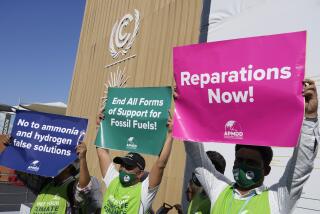Warming to Standards
- Share via
In a Rose Garden press conference Monday, President Bush is expected to unveil an “action plan” to fight global warming, a growing problem according to a report released last week by a scientific panel that Bush himself assembled. The panel, chaired by UC Irvine Chancellor Ralph Cicerone, concluded that the Earth will warm by about 5.4 degrees in the next century, causing climatic upheaval.
Bush administration officials are hoping the “action plan” will shield the president from the rhetorical flack that 15 European leaders are sure to throw at him when he arrives for a summit in Gothenburg, Sweden, on Thursday.
Their hope may be in vain. If the plan bears any resemblance to the one that Vice President Dick Cheney proposed last week--calling for only voluntary caps on carbon emissions--it will simply increase the already white-hot temperatures of the president’s European colleagues.
Furious at what they perceive to be the Bush Administration’s glib dismissal of an international global warming reduction agreement earlier this year, European leaders are now demanding that the United States support mandatory controls on the emissions of fossil fuels like carbon, the soot that industry smokestacks and automobile tailpipes belch.
In a brilliant, if bogus, bit of spin, national security advisor Condoleezza Rice last week suggested that delaying global warming reduction measures would actually be more responsible than promptly implementing them.
“We’re taking this seriously enough,” Rice said, “that we’re not just going to slap something together and say, ‘OK, that’s it.”’
In fact, there are plenty of well-considered, bipartisan steps that Bush could take tomorrow if he wanted to get serious about global warming. He could, for instance, support a bill by Sens. Dianne Feinstein (D-Calif.) and Olympia Snowe (R-Maine) that would close an outrageous loophole in federal law that lets vans and sport-utility vehicles escape higher fuel efficiency standards.
As Feinstein rightly points out, making that one change would save an amount of fuel equal to projected production from the Arctic National Wildlife Refuge. Closing the SUV loophole would also meet fully half of the fossil fuel reductions that the U.S. agreed to make in a treaty on global warming that the Clinton administration signed in Kyoto, Japan, in 1997. Bush argues that the best way to reduce carbon emissions is by encouraging polluters to make voluntary reductions. The problem is that privately most Bush administration officials admit that vague entreaties don’t work.
That is precisely why Bush, in an attempt to protect the jobs of American steel workers, announced last week that he would press foreign leaders to agree to make legally binding, hard-and-fast reductions in their output of steel.
If Bush does not think voluntary reductions will be enough to reduce steel production, then why does he think they will be sufficient to reduce carbon emissions?
It’s a question that European leaders should press him to answer.
More to Read
Get the L.A. Times Politics newsletter
Deeply reported insights into legislation, politics and policy from Sacramento, Washington and beyond. In your inbox twice per week.
You may occasionally receive promotional content from the Los Angeles Times.










